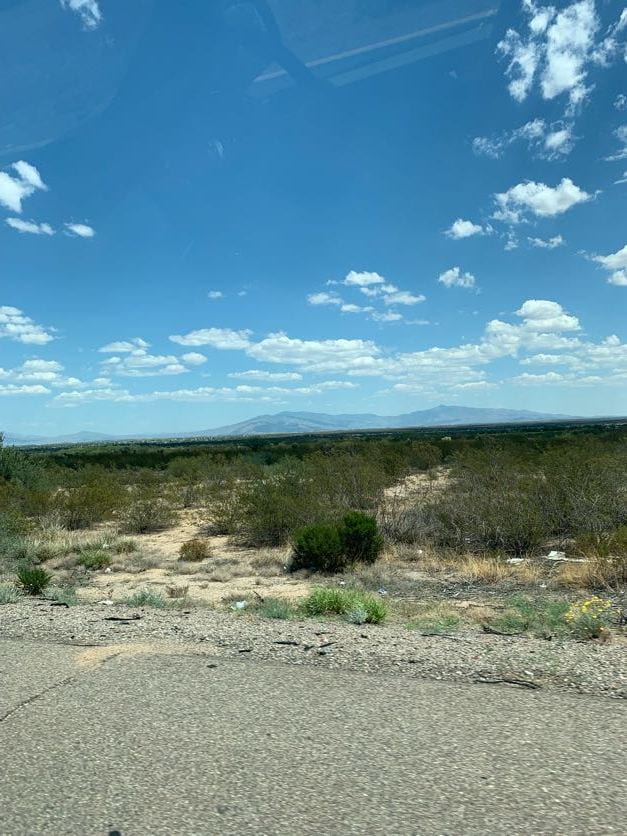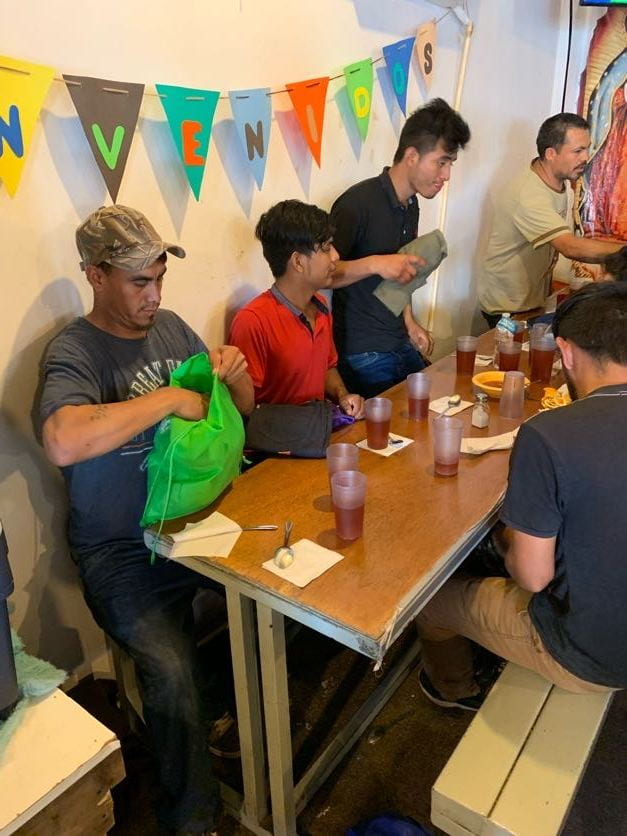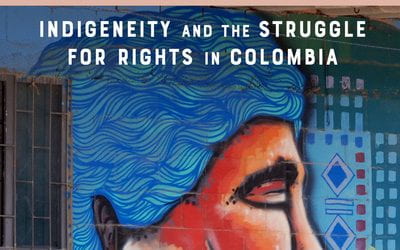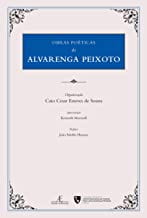Exodus Testimonios
Migrant Pentecostal Spirituality in the U.S/Mexico Borderlands
The audience at Iglesia Monte de Sion was ecstatic as believers lined up to share their testimonials. “God delivered us from Egypt and brought us to the Promised Land,” said José as he shared his testimonio with the small Latinx Pentecostal church in central California. “Even when Pharaoh sends his forces, God will always make way for His people.” The assembly responded with a resounding “amen” and José evoked Deuteronomy 8:4 noting that, “We never lacked food, shoes or clothes in our journey.” At first glance, one might think he is simply retelling the Exodus of the Israelites from Egypt and their journey to Canaan.
But for this migrant congregation, the Exodus story offered a framework to share their testimonios or narratives of divine intervention, which range from conversion stories to miraculous events in a believer’s life. Indeed, by “deliverance from Egypt,” José referred not only to his spiritual redemption from sin but also to his migration journey from Honduras to Bakersfield, California. Similarly, José’s allusion to Pharaoh’s forces was not a reference to the deadly Egyptian army and not even a typical spiritual connection to the forces of darkness. Instead, it was a concrete allusion to President Trump and border patrol agents in the United States.
In Latinx migrant spiritualities, the Exodus story is not a fixed narrative of deliverance but a fluid testimonio that articulates divine intervention and personal agency in one’s migration journey. Three essential aspects of migrant spiritualities come to the forefront. First, migrant spiritualities mold the biblical notion of Egypt to articulate the dilemma of vilifying a beloved home and settling in a better yet distant land. Second, migrant spiritualities rework the Wilderness Wanderings to accentuate divine intervention in the U.S./Mexico borderlands and turn it into a temporary home. Finally, Pentecostal migrants use the Promised Land’s notions to legitimate the violation of various laws in the name of human flourishing.
Theorizing Testimonios
Pentecostal testimonios are experiences of the sacred that nuance personal agency in the struggles we face daily. They reflect what Ada Maria Isasi Díaz describes, in Lo Cotidiano: A Key Element of Mujerista Theology, as “lo cotidiano” or “…the practices and beliefs that we have inherited, with our habitual judgments, including the tactics we use to deal with the every day.” From religious conversion stories to miraculous deliverance accounts, testimonios serve to affirm that God is still actively involved in human affairs.
Each Pentecostal migrant has a testimonio and often uses it to validate his/her faith and membership in the Christian community. Unsurprisingly, religious services include a time for testimonios. As José’s testimonio demonstrates, migrant spiritualities turn to the Exodus narrative neither to find a voice nor to establish simplistic correlations between modern and ancient communities. Instead, they point to what Harvard anthropologist Michael D. Jackson, in his book The Politics of Storytelling: Violence, Transgression and Intersubjectivity 2002, refers to as the intersubjective interplay among private and public realms, interests and power relations.
As they strategically exaggerate the agency of the migrants, testimonios bend the boundaries of self, kinship and citizenship depending on the situation. But testimonios are far from being deceptive accounts to get out of trouble or get ahead in life.
As spiritual narratives, testimonios construct a cosmovision that addresses the practical questions of faith: Where is the Spirit leading the believer? Like Abraham, the migrant par excellence, migrants must decide how much they are willing to sacrifice to obey God. Hardly ever do personal and divine goals merge. Thus, testimonios do not simply interpret but rewrite the Exodus story.
An Egyptian Home
In their appropriation of the Exodus story, Migrant Pentecostal testimonios reflect an ingenious understanding of Egypt’s biblical notion. Biblical authors consistently cast Egypt as a place of bondage and oppression. This idea serves as a rationale for divine intervention on behalf of the Hebrews: “Then the Lord said, ‘I have observed the misery of my people who are in Egypt; I have heard their cry on account of their taskmasters. Indeed, I know their sufferings, and I have come down to deliver them from the Egyptians…” (Exodus 3:7-8a: NRSV). As José’s migration account reflects, testimonios retain Egypt’s vilification as a place of sin and oppression. “One can no longer make a living there” or “there is lots of poverty and violence” are some of the most commonly cited reasons for undertaking the migration journey. Yet, the characterization of a home country as an Egypt of sorts is ambiguous at best.
In Pentecostal testimonios, Egypt also emerges as a beloved home and, under the right circumstances, as paradise itself. The rhetoricity of testimonios is clear. Migrants must in some way vilify their previous home to justify seeking asylum in another country. But to what extent? And, at what cost? How much should one condemn a home one hopes to return to in the distant future? The attachment to the Land and the pain of leaving loved ones behind leads migrants to rewrite the notion of Egypt from a place of oppression to a home that is no longer sustainable, but remains nonetheless a home.
Thus, testimonios read against the grain of the biblical text and tradition. The 10 plagues that God uses to press Pharaoh’s arm (Exodus 7:14-12:36), for instance, are no longer a sign of deliverance. Instead, they emerge as calamitous events that rendered the milpas—the harvests— barren, triggering the migration. Adopting this view, however, aligns Pentecostal migrants more with the Egyptians than with the Israelites themselves!
The Wilderness as Borderlands
As accounts of divine deliverance, Migrant Pentecostal testimonios integrate essential aspects of the Wilderness Wanderings of God’s people on their way to Canaan. As the biblical narrative ascertains, perils, temptations and moments or reprieve characterized the journey. Faced with limited access to water (Exodus 15:24) and starvation, the Israelites complain to Moses and Aaron: “ The Israelites said to them, “If only we had died by the hand of the Lord in the land of Egypt when we sat by the fleshpots and ate our fill of bread; for you have brought us out into this wilderness to kill this whole assembly with hunger” (Exodus 16:3: NRSV). God intervenes on their behalf, providing manna and quails for the demanding Israelites (Exodus 16:13-15).
In their testimonios, Honduran Christians ascertain the precariousness of their 1,616-mile journey to the United States, as well as God’s salvific intervention on their behalf. “We lacked food and protection. If God had not intervened, we would have died in the desert,” said Felipe, a 27-year-old immigrant from the Northern Triangle (as Honduras, Guatemala and El Salvador are known), after his triumphant entry into the United States. He was also keen to underscore that God had protected them from local smugglers and cartels, who have turned to human trafficking as a source of income. Aware of the bad reputation that caravans carved for themselves among Mexican communities, Pentecostal migrants often express gratitude in their testimonios. In this manner, migrant Christians seek to disassociate themselves from the rebellious Israelites and reassure locals that they welcome and value their support.
Migrant Pentecostals also appropriate the forty years of Wilderness Wanderings to address unexpected contingencies along the journey to the United States. When the Trump administration implemented the Remain in Mexico policy, thousands of migrants returned to Mexico and had to remain there until their asylum cases were resolved. Much against their will, migrants are caught up in borderland. As Gloria Anzaldua notes in Borderlands/La Frontera: The New Mestiza, a borderland constitutes “una herida abierta,” (an open wound). It is a place where the South grinds against the North and bleeds, creating a third space that is in a constant state of transition. Since they are unwelcomed in both the U.S. and in Mexico, migrants are quick to say, “Somos fronterizos. No somos ni de aqui, ni de alla” (We are from the borderlands; from neither here nor there).

Portrait of Jose Antonio Elena Rodriguez who was gunned down by border patrol officer Lonnie Schwartz through the open slots in the border wall on April 10, 2012. Schwartz was never convicted.
Through the reference to the Wilderness Wandering, testimonios explain delays in reaching the Promised Land while accepting the Mexican borderlands as a home of sorts. “Perhaps it’s not the time” or “we didn’t do things right,” or as some Haitian immigrants wittingly point out, “We came looking for the American Dream, but under the present circumstances, the Mexican Dream will do.” Others find comfort in recalling, “God does not dwell in set place but accompanies his people in a tabernacle that becomes “God’s own mobile home.” Thus, testimonios enable migrants to ascertain divine agency even as they negotiate the borderlands’ unstable geopolitics.
Promised Land
The notion of Promised Land figures prominently in Pentecostal testimonios and drives the impetus to migrate. In the biblical narrative, Canaan emerges as a significantly prosperous land. Still, it is also inhabited, and YHWH makes this clear, “I declare that I will bring you up out of the misery of Egypt, to the land of the Canaanites, the Hittites, the Amorites, the Perizzites, the Hivites, and the Jebusites, a land flowing with milk and honey” (Exodus 3:17). What about the people living there? The divine promise in Exodus not only echoes the covenant with Abraham in Genesis 12:1-3 but anticipates that God approves the conquest of the Land.
As testimonios reveal, migrant Christians use the notion of Promised Land to relativize the violation of geographical and ethical boundaries. Whereas migrants often transgress ethical and moral norms or act outside the “law” in the name of living “El Sueño Americano,” migrant Christians seem to break immigration laws in the name of divine law. Because theirs is a spiritual journey to a divinely appointed place, such transgression is not only permissible but necessary to obey God, lest they perish in the desert like some of the rebellious Israelites. Citing Acts 5:29, and often out of context, migrants are quick to note that “…It is better to obey God rather than men.” Unsurprisingly, in their encounter with Mexican immigration authorities, a group of Honduran women paraphrased Moses’ demand to Pharaoh in Exodus 5:1, “Dejen pasar a mi pueblo dice el Señor” (The Lord says, ‘let my people go through!’)
Pentecostal migrants also deploy the Promised Land topos in their testimonios to counter anti-immigrant rhetoric that characterizes them as disease carriers, rapists, and criminals. Citing the strict ethical and religious code to which they adhere, some migrants in Delano, California, noted “We are not allowed to drink alcohol, to steal and dress like gangsters because those things do not please God.”
Responding to claims that migrants take jobs from locals, exploit social services, and do not pay taxes, testimonios often highlight the sacrifices made by migrant workers during the pandemic on behalf of U.S. society. “We have not stopped working the fields during the pandemic so there will be food for our families and for others,” said a group of migrant workers in Bakersfield, California. In their view, God fulfills his promises and, as with all covenants, migrants must now fulfill their promises to God.
Returning Home
In the event of deportation, testimonios quickly shift the moral poles, turning the United States into Egypt and one’s previous home into an improvised Promised Land. “There is lots of racism and sin here in the U.S.; I think I am better off in my country,” said Lupe, a Honduran immigrant at a shelter for deportees in Nogales, Mexico.
What has not changed is the agency of migrants and God’s active role in their testimonios. “It wasn’t God’s will” or “He delivered us from a place of sin” are typical statements migrants offer to rationalize their deportation.
Thus, contrary to common assumptions, testimonios hardly show facile correlations between the plight of modern migrants and ancient Israelites. Instead, they continuously adapt, redeploy, and rewrite the Exodus story in the name of some divine call to migrate.
Winter 2021, Volume XX, Number 2
Roberto Mata is Assistant Professor of Religious Studies at Santa Clara University. His recent work includes the article “Border Crossing into the Promised Land: The Eschatological Migration of God’s People in Revelation 2:1-3:22” in Latinx the Bible and Migration. Contact:rmata@scu.edu
Related Articles
Indigenous Peoples, Active Agents
Recently, the Amazon and its indigenous residents have become hot issues, metaphorically as well as climatically. News stories around the world have documented raging and relatively…
Beyond the Sociology Books
If you are not from Colombia and hoping to understand the South American nation of 50 million souls, you might tend to focus on “Colombia the terrible”—narcotics and decades of socio-political violence…
Poetry and History in 18th-century Brazil
In his presentation of the beautifully published volume, Obras Completas de Alvarenga Peixoto, historian Kenneth Maxwell turns our attention to one of his specialties, the late 18th-century









